With the rise of remote work, evolving workforce demographics, and consumer behavior changing by the minute, there’s no doubt that any business’s sales tactics need to be adaptable — that means changing your sales tactics to meet buyers where they are (and your sales team where they are, as well).
To do that effectively, you need a strategic sales plan. A sales plan tells you and your entire sales team how to approach sales to maximize revenue, improve customer retention, and meet other sales goals.
In this article, we’re diving deep into strategic sales plans. We’ll cover what they are, why you need one, and how to build one in just 5 steps.
What is a strategic sales plan?
A strategic sales plan is a collection of documents, processes, and other information that defines how your business approaches sales. Your strategic sales plan can include guidelines for prospecting, lead generation, marketing, and more. Essentially, a strategic sales plan provides a roadmap to help you meet your goals. It also provides a framework for adapting to new industry trends.
For instance, 44% of millennials say they don’t want to interact with a sales rep during the B2B buying process:
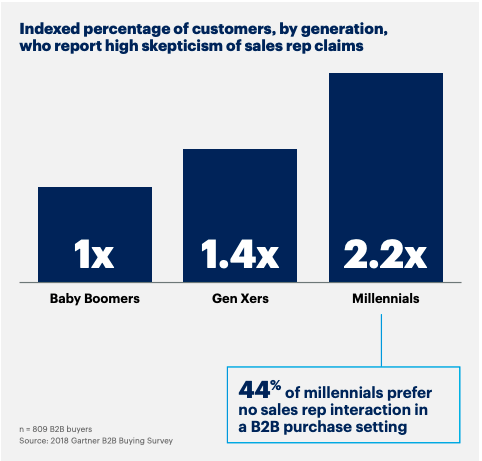
As a result, your strategic sales plan should identify ways to minimize sales rep interactions — while still maintaining or increasing revenue.
Why does your company need a strategic sales plan?
Think about all the components of your company’s sales process. From outreach management to lead scoring to relationship management, there are tons of moving parts.
A strategic sales plan provides a holistic view of how your sales strategy works. It also makes sure every part of the sales process is effective, goal-oriented, and on-brand.Here are a few other things your strategic sales plan should include:
- Sales goals and KPIs
- Buyer personas for your target market
- Lead scoring criteria
- Primary sales channels
- Marketing strategy
- Prospecting criteria
- Relationship management strategy
- Inbound sales vs outbound sales strategy
- Sales presentations, contracts, and other documents
In 2022, it’s also important to consider your virtual selling strategy. Fifty percent of buyers say working remotely made purchasing easier, which means it’s critical your business maintains that level of ease.
Find the right CRM system for your sales strategy plan
Before we get into the steps for creating a strategic sales plan, let’s talk about CRMs. CRM software is an invaluable tool to help you manage your entire sales process, from sales planning to lead scoring to the sale.
As we go through the strategic sales planning steps in the next section, a CRM tool will help you stay organized and share your process with your entire team.
Some CRMs, like monday.com, even have a Supporting sales materials template to help you get started.
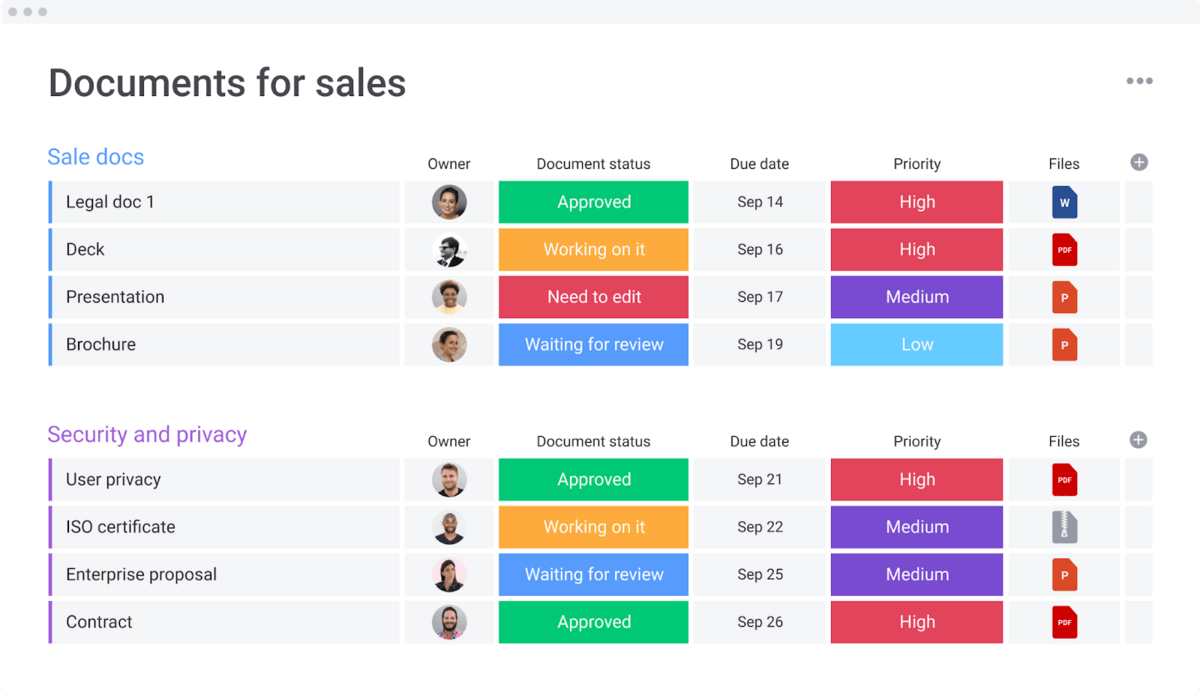
Your CRM is essential to every part of your sales process. LinkedIn reports that most salespeople only spend 37% of their time actively selling, with the majority of their time taken up by digital paperwork — manual or unnecessary tasks.
A CRM with workflow automation — like one built on the monday.com platform — increases the amount of time your sales reps can spend actually selling, which will drive increased revenue for your business.
Your CRM should support your strategic sales plan. Here’s what to look for:
- Contact and lead management
- Sales pipeline tracking
- Prospecting and outreach management
- Contact and customer relationship history
- Integrations with old CRMs or other tools
- Workflow automation
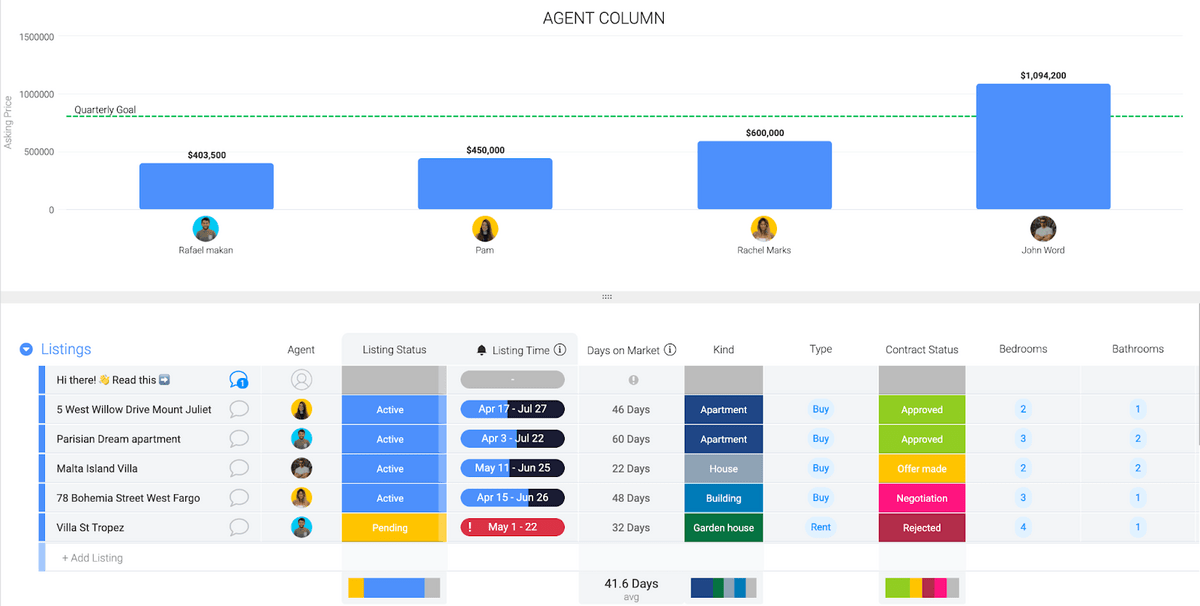
monday.com’s Work OS platform allows you to build exactly the CRM you need. You can customize any template or board to fit your sales strategy.
Here’s how it works:
5 steps to build a strategic sales plan
To help you build your strategic sales plan, we’ll look at the main steps to creating one for your sales team. Along the way, we’ll also look at how to use the monday.com CRM as you develop your sales plan.
Set the right sales goals
To create a roadmap, you need a destination. That’s why the first step in any strategic sales planning is to determine your sales goal for the upcoming month, quarter, or year.
Your sales goal should follow the SMART method. Record these goals and be sure to share them with your sales team. You can track your sales goal progress in a sales dashboard in your CRM. You’ll get up-to-date information on your sales performance, while anyone in the company who needs sales data can always access a single source of truth.
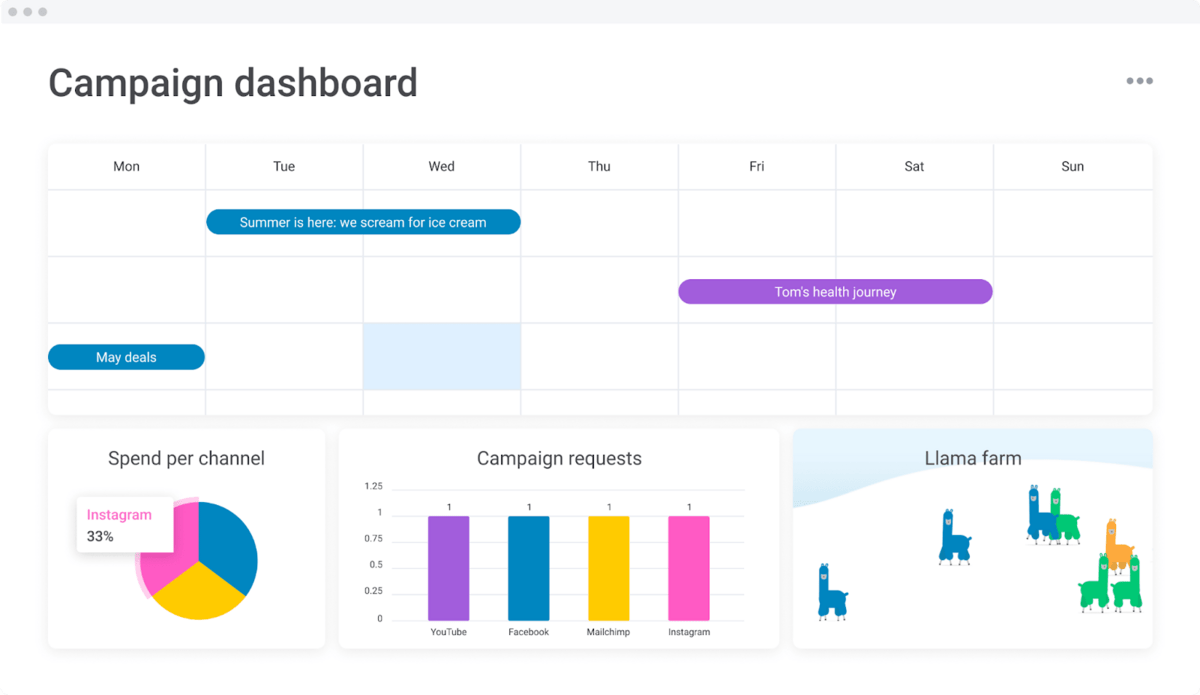
Tracking your sales data is really important for strategic sales planning. Sales data helps you identify your strengths and weaknesses and optimize every part of your sales process to return the best results.
Strengthen your customer personas
Understanding your audience is the key to an effective sales strategy. When you know what they want and need, where they spend time online, and how they prefer to buy, you can craft a sales strategy based on personalizing your approach to your customers’ needs.
For example, 77% of B2B buyers state that their latest purchase was very difficult or complex. If you’re a B2B seller, you can focus on ways to make your sales process simpler than your competitors to attract new buyers.
Data is your friend when it comes to sales personalization. In fact, 56% of sales professionals use data to target customer accounts. Take your findings and craft buyer personas to help your sales team understand your key audience segments. As you create these and other sales documents, you can track your progress in a monday.com project management board.
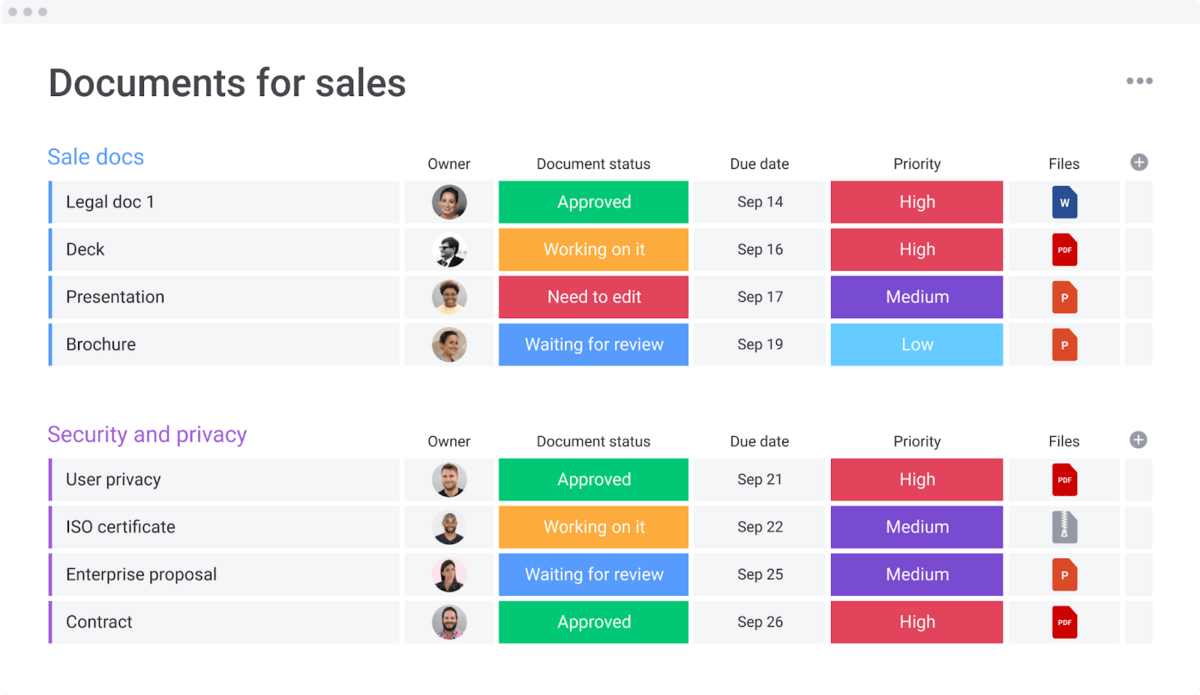
Don’t rely solely on personas, though — continuously building unique relationships with your customers to deliver an even higher level of personalization is more important than ever.
Outline your sales pipeline
This is possibly the most critical step of your strategic sales plan: list every stage a prospect will go through before they become a sale. Outlining your sales pipeline is important for a few reasons. First, knowing the customer journey makes it easier to identify problems early and pivot to meet sales goals.
But it’s also key to creating efficient processes for your sales team. As you list your sales pipeline stages, make note of the following key points for your internal sales team:
- When does a prospect become a lead?
- What counts as a conversion?
- Are some touchpoints more valuable than others e.g. an email open vs. a social media ad view?
- When do sales development reps (SDRs) hand off leads to sales executives?
- When does the marketing team hand off leads to the sales department?
When you build your sales pipeline in a monday.com CRM template, you can create custom labels and columns to note exactly where each lead stands.
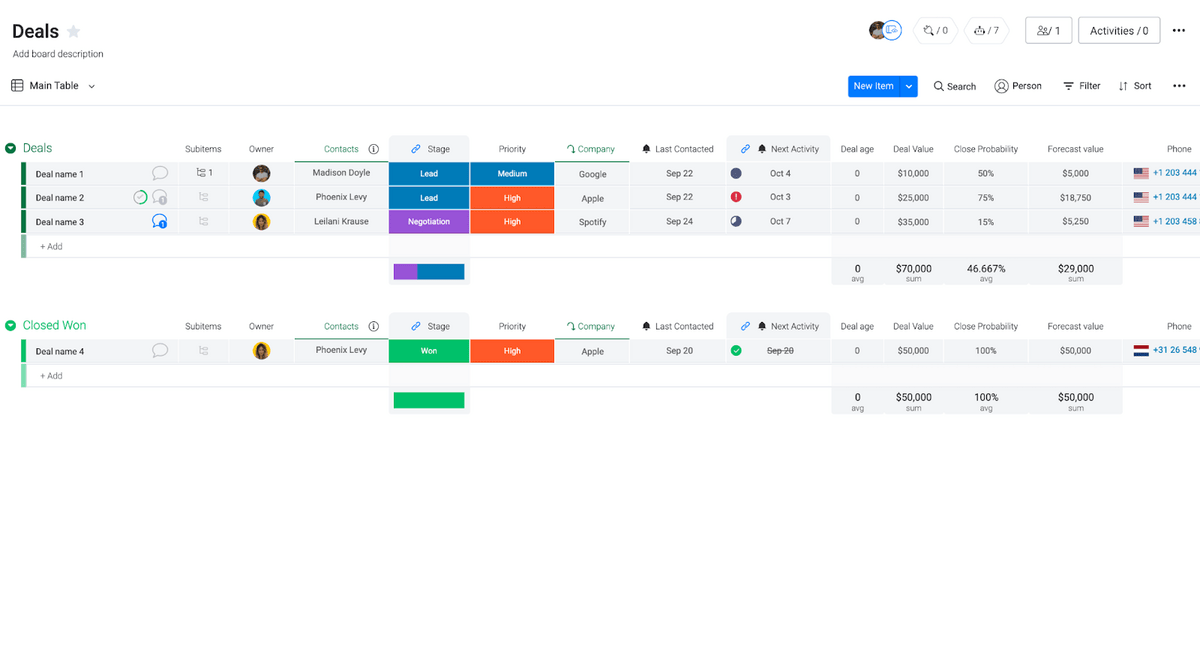
You can even automate lead handoffs based on certain actions, such as a certain number of touchpoints or email opens, by integrating your other data tools with monday.com.
Choose your sales tactics
Next, you need to decide what methods you’ll use to sell your product or service. To do this, think about what will work best based on your audience. You’ll likely come up with a list of tactics that work best based on different audience segments or other factors.
Your strategic sales plan can include guidance for when it’s appropriate to use each type of sales tactic and how to choose the right one.
Here are just a few sales tactics you might choose at different stages of the sales funnel:
- Find targeted leads
- Leverage retargeting with online marketing
- Display social proof
- Ask for referrals
- Follow up consistently
You might also adopt some consistent sales tactics or values, such as positioning sales reps as knowledgeable consultants. Consider that 88% of today’s buyers think of sales reps as trusted advisors in their industry, and figure out how to meet that expectation for your customers.
Your strategic sales plan should also include tactics for customer retention. 70% of sales professionals say they are prioritizing retaining existing customers, making it worth spending time and energy on following up with leads.
It’s important to continue honing your customer relationships even after closing the sale.
monday.com’s contact management template helps you track your entire communication history in each customer profile, so you can find the right time to follow up or offer new deals based on your prior interactions.
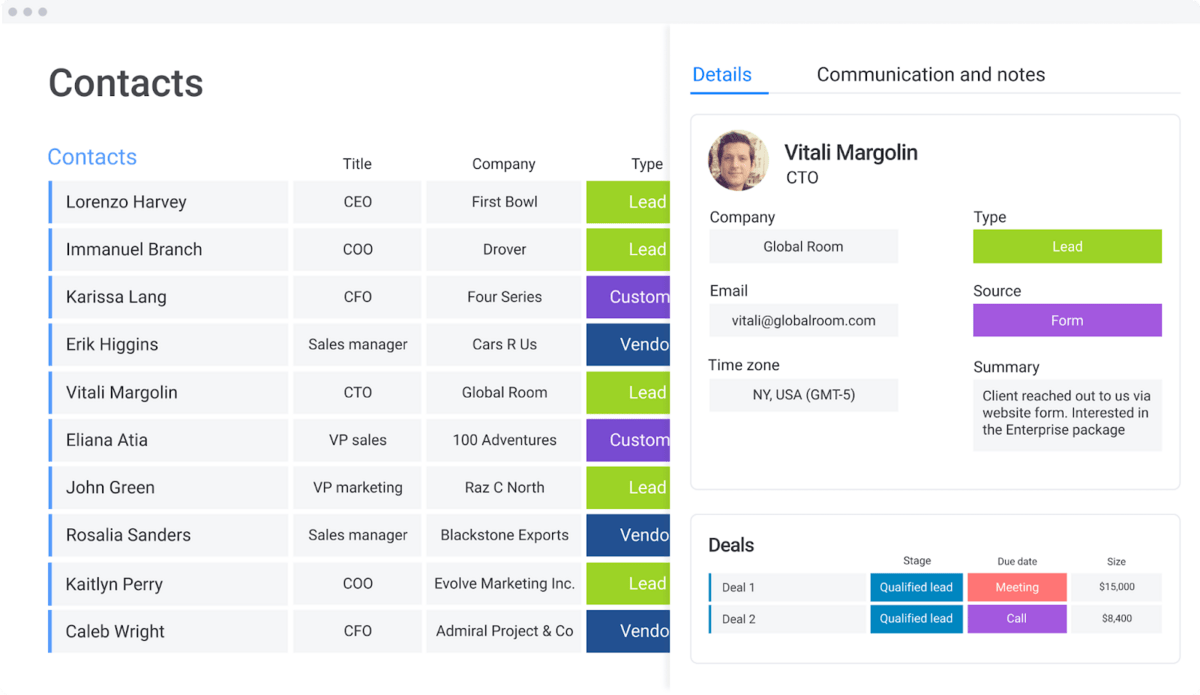
When combined with automation and sales and marketing tools like MailChimp, your monday.com CRM can take care of a lot of your customer relationship management for you by sending follow-ups, scoring leads, and more.
Implement and refine your strategic sales plan with your CRM
Once you’ve finalized each component of your strategic sales plan, it’s time to share it with your team and hit the ground running.
Make sure your sales team can access your sales planning documents and the right boards and views in your CRM. Provide any necessary sales training on the CRM or new sales tactics.
In the early stages of your new sales plan, ask for lots of employee and customer feedback. Use this information to refine and update your sales goals, tactics, and plans to align with what’s best for your business, your team, and your customers.
As your business and customer base grows and evolves, your strategic sales plan will too. Consistently track the impact of your plan so you can stay effective.
To help you do this, invest in a CRM that grows and changes with you. monday.com adapts right along with your business and makes it easy for everyone to get up to speed.
Build your strategic sales plan today
When you look at the facts, it’s simple. Building a strategic sales plan can help your business close more sales and earn more profits. By understanding your customer journey and creating clear guidelines around your sales strategy plan, your team can become more effective and profitable than ever.
Start using a platform like monday.com to build all the tools you need to execute your strategic sales plan perfectly. Try out the monday.com CRM today.

